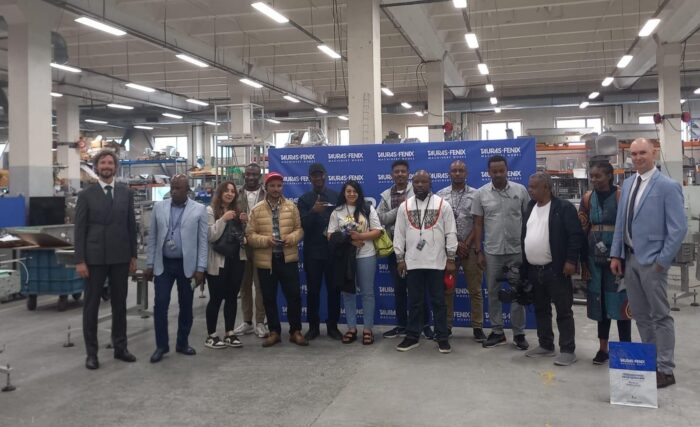Global Issues
Prominent African Journalists Visit PhosAgro’s Volkhov Plant, by Kestér Kenn Klomegâh

Journalists from leading African media took part in an extensive tour of the production facilities and infrastructure at PhosAgro’s Volkhov production complex, including the plant’s upgraded phosphoric acid and mineral fertilizer production facilities, as well as the new SK-800 sulphuric acid plant and new energy facilities, which recycle process steam into electricity for the plant.
The journalists heard presentations on PhosAgro’s activities and the significant role that the Company and the Russian mineral fertilizer industry play in ensuring global food security and supporting humanitarian projects in Africa.
PhosAgro invested over RUB 34 billion to develop its Volkhov complex. Thanks to extensive upgrades and new construction, the plant has increased its annual production of mineral fertilizers to over 1 million tonnes, a more than fivefold increase since 2019, when construction of the new production facility began. The processing of phosphate rock has increased more than sixfold compared with 2019 to over 1.6 million tonnes; the production of sulphuric acid, more than fivefold to 1.1 million tonnes; and the production of phosphoric acid, more than sixfold to about 600 thousand tonnes. The plant’s location near Baltic ports, which are focused on exporting products to friendly countries, enhances the Company’s capacity to export products to Africa.
As PhosAgro’s Deputy CEO for Finance and International Projects, Alexander Sharabaika, noted during the briefing, PhosAgro is working closely with international organizations to implement humanitarian initiatives in Africa. As part of the Green Chemistry for Life programme, in partnership with UNESCO and the International Union of Pure and Applied Chemistry (IUPAC), the Company provides grants to young scientists studying the application of advanced chemical technologies in areas such as environmental protection, natural resource management and waste recycling.
Over seven selection rounds, the international jury has reviewed over 900 applications and awarded grants to 48 young researchers, including 13 talented African scientists from Egypt, Kenya, Nigeria, Tunisia, South Africa, Sudan and Zimbabwe. In addition, more than 200 young researchers from Africa have received stipends as part of the Green Chemistry Summer School programme organized by IUPAC and PhosAgro.
In 2019, PhosAgro became an official partner for the launch of a regional network of soil laboratories in Africa (AFRILAB) as part of a joint project with the UN Food and Agriculture Organization (FAO). The African network currently has 220 laboratories across 54 countries that assess the quality and safety of fertilizers and monitor soil conditions. To date, more than 11,000 farmers from 20 developing countries have already participated in the project. Approximately 4,500 farmers from over 20 African countries have received training through the programme. The programme will be expanded this year to include even more new African farmers.
“Another key aspect of our humanitarian efforts is sharing knowledge about sustainable agriculture through advanced educational tools. Last year, we launched an international platform called Pro Agro Lectorium, available in English and Portuguese and based on our Russian-language educational programme. Over the past year, it has evolved into a truly global educational hub for advanced agricultural technologies. Pro Agro Lectorium has been recognized as an official educational platform by the Agribusiness Working Group of the BRICS Business Council. In addition to BRICS, its work is supported by experts from the FAO, the International Union of Soil Sciences and world-renowned scientists,” said Mikhail Sterkin, PhosAgro’s Deputy CEO for Sales and Marketing.
University students can use PhosAgro’s platform to access the latest knowledge in the field of agrochemistry and to gain insights into their future profession. Graduates can use the lectures available on the site to get a head start in their careers, teachers can update their knowledge and engage in self-study and farmers can undertake additional training.
PhosAgro’s educational platform is constantly expanding, said Mr Sterkin. Nearly 60 leading academicians and practitioners from around the world, including 9 speakers from African countries, have recorded more than 420 lectures on agricultural science and agrochemistry, crop and livestock farming, innovation and digitalization in agriculture, economics and responsible agriculture. In collaboration with its African partners, PhosAgro is integrating its online platform into the educational process for African students. Nine cooperation agreements have already been signed with African universities.
During their tour, the journalists also visited both the Fifteenth Element corporate museum and exhibition centre, where they learned about the site’s history, and St Andrew’s Cathedral, which the Company built as part of its Spiritual Revival programme to promote cultural and spiritual values. The press tour concluded with a visit to the Staraya Ladoga Museum-Reserve, where the journalists thanked senior executives of PhosAgro and its Volkhov plant for inviting them.
PhosAgro’s main products, including phosphate rock, 58 grades of fertilizers, feed phosphates, ammonia and sodium tripolyphosphate, are used by customers in 100 countries spanning all the world’s inhabited continents. The company’s priority markets beyond Russia and the CIS are Latin America, Europe and Asia.

























